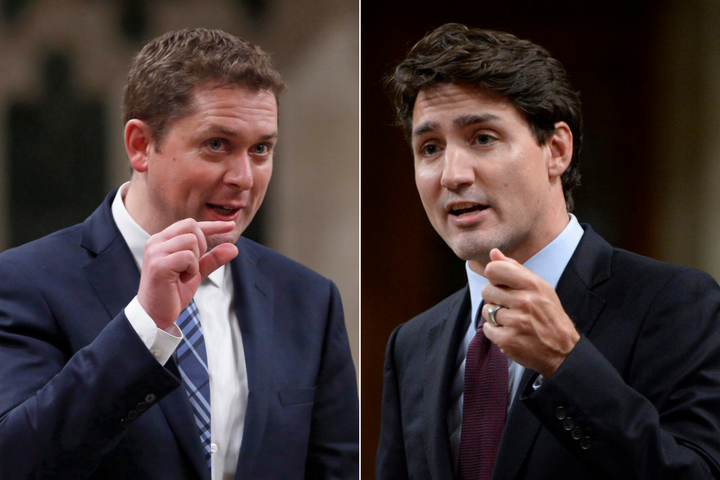Canadians from coast to coast are voting today in four byelections that seem set to paint a picture of just how well Prime Minister Justin Trudeau and Conservative Leader Andrew Scheer are resonating with voters.

But will the results actually matter?
“Byelections can matter depending on the riding,” said Susan Smith, principal strategist at Bluesky Strategy Group, a political consulting firm in Ottawa. “If there’s a riding that has been held for a long time by one party or the other and could change hands, that’s when it gets interesting.”
That is exactly the situation at play today.
READ MORE: 4 federal byelections to be held December 11
Voters in Bonavista–Burin–Trinity in Newfoundland, Scarborough–Agincourt in Ontario, and Battlefords–Lloydminster in Saskatchewan are generally expected to return their incumbent parties to their seats: in Newfoundland and Ontario, that means the Liberals, while the Saskatchewan riding is a stronghold for Conservatives.
The riding drawing the most speculation is that of South Surrey–White Rock in B.C..
It used to be held by Conservative MP Dianne Watts but she resigned in September to run for the leadership of the B.C. Liberal Party.
READ MORE: Dianne Watts to seek BC Liberal leadership, step down as Conservative MP
- Budget 2024 failed to spark ‘political reboot’ for Liberals, polling suggests
- Train goes up in flames while rolling through London, Ont. Here’s what we know
- Peel police chief met Sri Lankan officer a court says ‘participated’ in torture
- Wrong remains sent to ‘exhausted’ Canadian family after death on Cuba vacation
That move put the riding into play in a race that has become too tight to call.
The Conservatives are running former national revenue minister Kerry-Lynne Findlay, who was rejected by voters in the 2015 election in the nearby riding of Delta-Richmond East, and the Liberals are running Gordie Hogg, who served as a B.C. Liberal MLA for the provincial riding in the area for roughly 20 years.
A Conservative victory would not necessarily signal a rising blue tide ahead of the general election in 2019 given they have held the riding for years – but a loss could be an early warning that the party and its leader Andrew Scheer have a problem.
“That’s the one I’m watching, and if the Conservatives lose it’s going to sting. This would be the second byelection loss for Scheer as leader, that always hurts,” said Michele Austin, senior adviser with Summa Strategies in Ottawa and a former chief of staff to both Rona Ambrose and Maxime Bernier.
“I don’t think that the Conservatives are prepared for that, if it happens.”
READ MORE: Justin Trudeau credits Liberal economic agenda for upset win in Quebec byelection
The Tories lost the Lac-Saint-Jean riding in Quebec that his party won from the Bloc Quebecois in 2015 to the Liberals in October.
Austin says losing a second time might not signal defeat in 2019, but it would give the party pause.
“The Conservatives are going to have to look hard at where they can gain seats if Justin Trudeau can waltz into B.C. and take that one back,” she said.
“The Conservatives are going to have to reset, adjust, decide whether or not it’s just a byelection blip or whether it’s a trend, and go from there.”
The results will boil down to a combination of two core factors: whether voters are motivated enough to show up at the polls and whether they either like what the Conservatives under Scheer are offering or want to hop on the momentum of the Trudeau Liberals.
WATCH BELOW: Conservatives ‘not concerned’ in Lac-Saint-Jean byelection upset

Complicating factors around the issue of voter turnout, such as constituents who might answer the phone to take a poll but not actually show up to vote, mean trying to look at byelections as “political tea leaves” can be difficult, said Greg MacEachern, senior vice-president at Environics Communications.
“For the most part, a byelection is going to give you a very similar result to the last election or there may be some tendency to favour the sitting government. It’s only when there’s been a major change that the results are significant.”
One other factor to watch, he said, is how much buzz the NDP and its new leader, Jagmeet Singh, are able to generate on the ground in both B.C. and the Toronto riding of Scarborough-Agincourt.
While the party is unlikely to win either seat, watching whether they are able to come nipping at the Liberals’ heels will have many Conservatives eagerly checking for the final numbers.
But for the NDP, the issue will be getting the traction to actually do just that.
Singh was elected in October but does not hold a seat in the House of Commons.
COMMENTARY: Jagmeet Singh needs to brush up on basic communications strategy
Since then, the federal political rookie – who had served as a provincial MPP in Ontario since 2011 before resigning his seat in October – has stumbled over questions from political reporters over everything from Quebec separatism and bilingual judges to whether he condemns the celebration by a small number of Sikhs of the Air India bombing mastermind as a martyr.
While the latter question prompted a fierce debate over whether it was racially loaded, critics also pointed to the fact that Singh seemed unprepared to answer the question at all as a potential red flag in his preparations for the minefields of federal politics.
“I don’t think that Jagmeet Singh has found his election mojo yet. This is somebody who is moving from provincial to federal politics, all of this is going to be new to him even though he’s experienced in Ontario,” said Austin
“I think that the NDP doesn’t even factor into these races. That story has yet to unfold.”




Comments